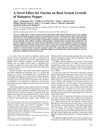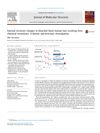 233 citations,
February 2018 in “Polymers”
233 citations,
February 2018 in “Polymers” Chitin and chitosan are useful in cosmetics for oral care, haircare, and skincare, including UV protection and strength improvement.
 January 2021 in “Middle East journal of applied sciences”
January 2021 in “Middle East journal of applied sciences” Zinc is essential for plant growth and human health, but many soils lack enough zinc, affecting crops and potentially leading to health problems.
 36 citations,
June 2019 in “eLife”
36 citations,
June 2019 in “eLife” The study developed a tool to predict how gut microbes process foods and drugs, showing that similar compounds often share metabolic pathways and effects.
 1 citations,
January 2017 in “Social Science Research Network”
1 citations,
January 2017 in “Social Science Research Network” The document suggests creating a secure database for indigenous knowledge and recommends that the TKDL actively fight patents that slightly alter traditional knowledge.
 39 citations,
September 2016 in “Expert Opinion on Drug Delivery”
39 citations,
September 2016 in “Expert Opinion on Drug Delivery” New drug delivery methods can make natural compounds more effective and stable.
 43 citations,
February 2020 in “Clinica chimica acta”
43 citations,
February 2020 in “Clinica chimica acta” Nano-sized plant-based chemicals could improve cervical cancer treatment by being more effective and causing fewer side effects than current methods.
March 2024 in “Antioxidants” Excessive blue light harms eye cells and disrupts sleep patterns.
 September 2023 in “Biology of reproduction”
September 2023 in “Biology of reproduction” New testosterone analogs show promise for male contraception with better activity and potentially fewer side effects.
 14 citations,
November 2013 in “Journal of the American Society for Horticultural Science”
14 citations,
November 2013 in “Journal of the American Society for Horticultural Science” Glycine slows main root growth but boosts root hair growth in habanero peppers.
 21 citations,
April 2012 in “European Journal of Pharmaceutics and Biopharmaceutics”
21 citations,
April 2012 in “European Journal of Pharmaceutics and Biopharmaceutics” The gel with special fat-loaded particles from rice bran could be an effective skin treatment for hair loss.
2 citations,
May 2023 in “Frontiers in Pharmacology” Natural products may help treat skin inflammation from abnormal adrenal hormones.
 August 2023 in “Natural Resources for Human Health”
August 2023 in “Natural Resources for Human Health” Vegetarians should take B vitamin supplements to avoid health issues.
 26 citations,
May 2021 in “International Journal of Molecular Sciences”
26 citations,
May 2021 in “International Journal of Molecular Sciences” Cheonggukjang may help prevent and manage various diseases and improve overall health, but its odor and safety concerns need addressing.
 5 citations,
December 1942 in “Journal of the American Medical Association”
5 citations,
December 1942 in “Journal of the American Medical Association” Choline and biotin are important for liver health and preventing certain deficiencies in animals, and more research is needed to understand their benefits in humans.
 2 citations,
May 2022 in “Horticulturae”
2 citations,
May 2022 in “Horticulturae” A plant protein biostimulant improved growth, photosynthesis, and nutrient content in hydroponically grown basil.

research Acne
4 citations,
January 2019 Acne is a common skin condition that can be influenced by diet, lifestyle, and hormones, and requires a treatment approach that includes psychological considerations.
 67 citations,
November 2019 in “Molecules”
67 citations,
November 2019 in “Molecules” Tea, especially green tea, shows promise in cosmetics for skin and hair benefits but more research is needed for effective use.
 1 citations,
November 2015 in “Indian Journal of Clinical Biochemistry”
1 citations,
November 2015 in “Indian Journal of Clinical Biochemistry” The conference presented findings on how vitamin D levels, genetic factors, and lifestyle choices like smoking and yoga affect various health conditions and diseases.
 1 citations,
July 2016 in “Cosmetics”
1 citations,
July 2016 in “Cosmetics” Black henna tattoos can cause severe allergies to hair and textile dyes, and there's a need for greater public awareness and regulation.
 14 citations,
April 2014 in “International Journal of Cosmetic Science”
14 citations,
April 2014 in “International Journal of Cosmetic Science” Acne is caused by multiple factors including oil production, bacteria, inflammation, and possibly diet and environment.
 November 2021 in “Journal of pharmaceutical research international”
November 2021 in “Journal of pharmaceutical research international” Herbal depilatories are safer and cause fewer side effects than chemical ones for hair removal.
 15 citations,
January 2016 in “Sustainable development and biodiversity”
15 citations,
January 2016 in “Sustainable development and biodiversity” Using PGPR as biofertilizers can improve soil health and plant growth while reducing reliance on synthetic fertilizers.
 July 2023 in “International journal of pharmacognosy and life science”
July 2023 in “International journal of pharmacognosy and life science” The herbal hair oil made from various plants might be a good alternative to synthetic hair loss treatments.
 14 citations,
January 2016 in “Elsevier eBooks”
14 citations,
January 2016 in “Elsevier eBooks” Liposomes improve the delivery and effectiveness of cosmetic ingredients but face challenges like cost and stability.
 7 citations,
October 2020 in “Dermatology practical & conceptual”
7 citations,
October 2020 in “Dermatology practical & conceptual” Some skin, hair, and nail supplements can be toxic, interact with medications, affect lab tests, and may increase cancer risk.
 118 citations,
July 2005 in “Journal of Ethnopharmacology”
118 citations,
July 2005 in “Journal of Ethnopharmacology” Eclipta alba extract improved learning, memory, and stress-related ulcers in rats without affecting movement or causing anxiety.
32 citations,
May 2017 in “Lasers in medical science” Radiofrequency treatment helps rejuvenate skin by boosting collagen and blood vessel growth.
 December 2022 in “Deleted Journal”
December 2022 in “Deleted Journal” Sheep wool keratin solution safely and effectively promotes hair growth.
11 citations,
January 2000 in “Journal of cosmetic science” Hydrolyzed wheat proteins penetrate all hair types effectively.
 4 citations,
August 2014 in “Journal of molecular structure”
4 citations,
August 2014 in “Journal of molecular structure” Chemical treatments on bleached black hair change its internal structure by breaking and reforming bonds, and treatments with hydrolyzed eggwhite protein help repair it.


























